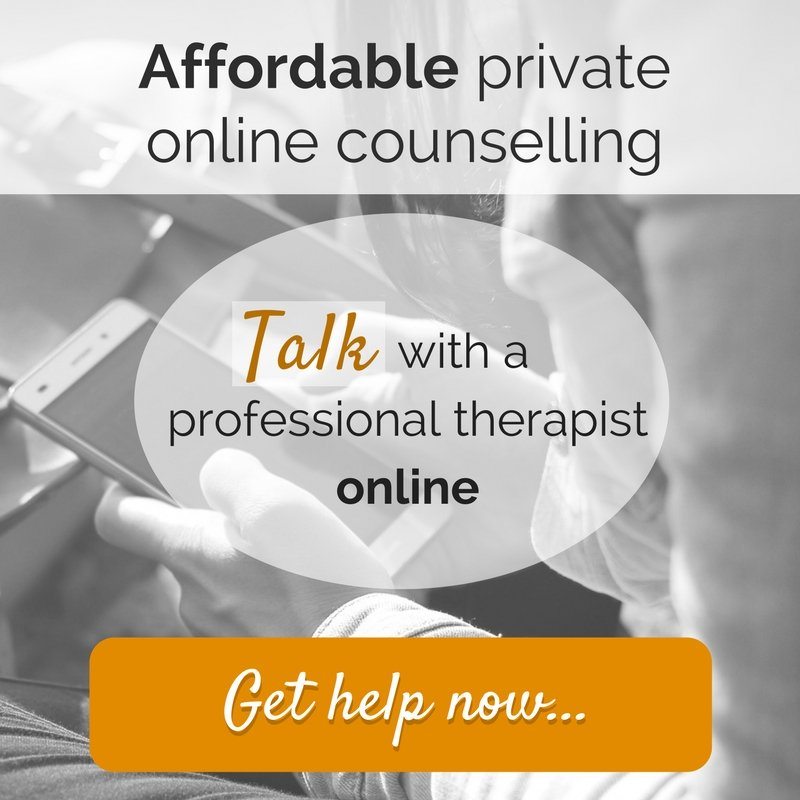Intimate Tickles Thought You Might Be Interested
Published: Thu, 12 Apr 2018 11:15:36 +0000
View Original Article
Category: Better Moods | Author and Publisher: Elly Prior | First published: 12-04-2018 | Modified: 14-04-2018
Since you’re searching for anxiety symptoms treatment, I’m assuming you’ve realised that your anxiety is out of control. Life probably feels like a series of huge challenges on a daily basis. This has no doubt left you feeling exhausted and low.
I can sooo understand that you’d do anything to get rid of those anxiety symptoms immediately. But, hold on! I wouldn’t want you to grab the first pill that’s advertised or offered as a magic cure. Because I’m afraid medication often does more harm than good, and there is no magic cure. But don’t despair – you don’t need magic to beat anxiety!
I’m so pleased you’ve found yourself on this page. It means you’re about to start taking charge of your feelings, and fixing the problems you’re facing.
You’ve clearly already discovered that anxiety is a word for excessive fear and worry which lasts too long and happens too often. I suspect you’re well aware of the symptoms, but just in case – you’ll find them in my related articles. So now you need to know how to treat it. This article explores the options available to you.
I want to be upfront with you – I may earn a commission from the referral. You will pay the same though, regardless.
What do I know?
I’m a qualified counsellor with over 24 years’ experience in professional practice. I specialise in couples therapy, which means I’ve probably helped twice as many people with anxiety as I otherwise would have! I’ve also spent time as pharmacy technician, so I’ve had my fair share of experience with medication too.
So, where do we start?
Firstly, with my reassurance that you’re not going mad, crazy or off your rocker. Neither are you likely to be suffering from a terrible sickness of the mind/body. The way you’re feeling is likely to be treatable. Steel yourself though: it’s going to take time and a great deal of effort from you as there is, very unfortunately, no magic pill.
Nevertheless, I really know – from having counselled so many people with anxiety, what you’re up against. Here’s a video of someone explaining what it feels like to live with anxiety, just to show you that I get how very hard it is…
Let’s start with identifying the kind of anxiety you might be suffering from before we talk about treatment.
Ready?
What sort of anxiety are you suffering from?
There are various underlying reasons that may contribute to – or be the cause of – your anxiety. So, I wonder what’s happening for you.
Which of the following applies to you? (Bear in mind, these may overlap.)
- You’re facing a dreaded event, such as an exam, meeting someone for the first time, an interview, a court or disciplinary appearance, etc.
- Things – life events, disappointments, difficult circumstances, stressful situations and the like – are piling up and you’re finding it increasingly difficult to cope with everything.
- You’ve suffered a trauma or series of traumas.
- You’ve always suffered with anxiety, from childhood or adolescence.
- You’re scared witless about something very specific and know it’s completely out of proportion. You know it’s a phobia, but you’re unable to get over it.
- You’re menopausal.
- You’re scared of your own reactions when your heart races and you panic for apparently no reason at all.
Generally speaking, we’re all likely to feel anxious before particular events or during specific periods in our lives.
However, for some of us, the severity of those anxiety symptoms makes normal everyday living very tough indeed. And some people feel anxious all the time, regardless of their current situation or what’s happening in their lives. If you recognise either of those statements in yourself, you might be having to constantly fight the urge to escape. And I wouldn’t be surprised if you’re feeling depressed to boot.
So let’s look at how your doctor and sites like WebMD and the Mayo Clinic might talk about your anxiety symptoms and treatment options.
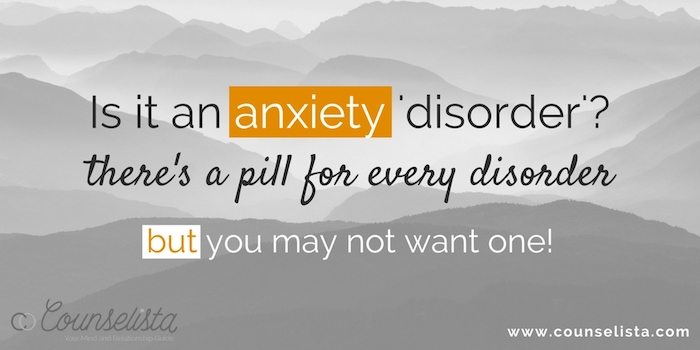
Could you be suffering from an anxiety ‘disorder’?
I’m so not a fan of medicalising conditions that affect the human mind. Labels like ‘disorder’ and ‘illness’ can create unnecessary fear and – hey, guess what? – anxiety!
Doctors will classify severe anxiety as one of six different types:
- generalised anxiety disorder
- social anxiety disorder
- panic disorder
- post-traumatic stress disorder (PTSD)
- obsessive compulsive disorder (OCD)
- phobias.
So, your doctor may class you as suffering from a mental health illness. But in the vast majority of cases, medical intervention is not the best anxiety symptoms treatment. Doctors and psychiatrists will generally prescribe medication. Yet, the medication they prescribe can potentially cause no end of harm according to Dr Peter Breggin.
I’m not saying you shouldn’t take the meds you’re being prescribed. I just want you to be vigilant, aware of the side effects and actively involved in deciding on the best possible treatment for you.
And I also don’t want you to start worrying that you’re mentally ill. Often, anxiety symptoms are not caused by a psychological disorder, but instead are the result of…
- everyday living
- toxic environments
- physical illness
- genetic predisposition
- and dodgy lifestyle choices
And in the most part, you have a measure of control over these stressors (even your lifestyle choices can switch genes on or off).
I also want to reassure you that you’re certainly not alone – 33.7% of the population is affected by anxiety during their lifetime according to this study by Borwin Bandelow MD, PhD and Sophie Michaelis MD.
So, to find effective treatment for your anxiety symptoms, you first need to figure out exactly where the stress and worry are coming from.
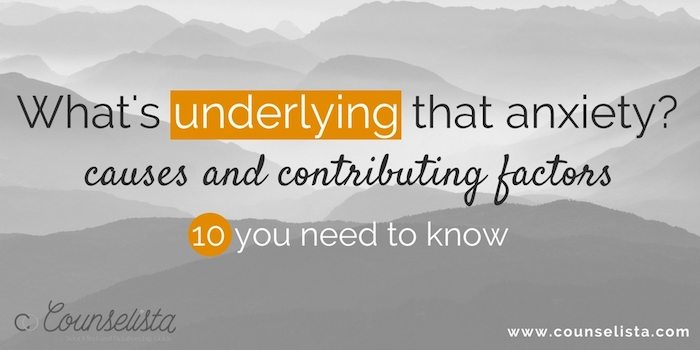
What’s behind your anxiety symptoms? Treatment… for what, exactly?
Here’s a list of potential causes of your anxiety. My treatment suggestions are in italics below each one, and we’ll explore them all in more depth further down.
10 Potential causes of anxiety with treatment
- Underlying physical disease(s) with anxiety as a symptom
Diagnosis and treatment by qualified (specialist) physician - Poor nutrition and digestive problems
Change in diet (yes, really – more on that later) - Unmet essential emotional needs
Lifestyle changes to meet inborn needs in balance - Lack of self-soothing skills during stressful times
Effective self-help with stress relief techniques - Overwhelming stress, difficult life events or stages, or impending burn-out
Talking therapy – professional counselling - Traumatic experiences
Specialist trauma treatment - Stress and/or phobias
Talking therapy (and medication, if you really want it) - Single stressful events or limited periods of potentially overwhelming stress
Talking therapy or over the counter herbal remedies - Anxiety symptoms caused by alcohol or drug abuse
Counselling/therapy - Predisposition to worry from childhood
Counselling/therapy
These are your options in a nutshell.
Let’s now look at each possible treatment for your anxiety symptoms a little more closely. Being informed puts you in a stronger position to make your own choices about the best treatment option for you.
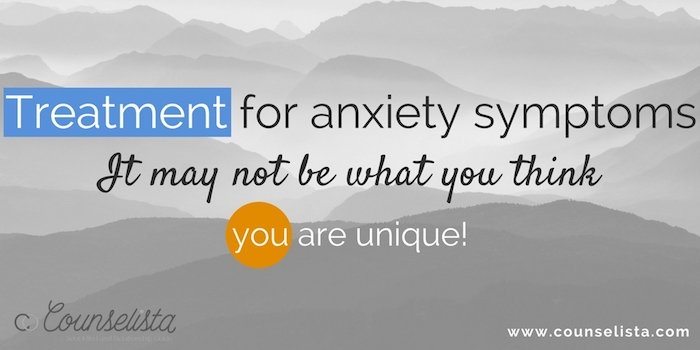
Anxiety symptoms – treatment considerations
1. Treatment for underlying physical diseases that cause anxiety symptoms
If you’re suffering from persistent symptoms of anxiety, treatment has to include an examination by a physician to rule out heart disease, lung disease, diabetes, problems with your digestive system (e.g. irritable bowel syndrome) or any other health problem (source: http://www.clinicaladvisor.com/features/separating-anxiety-from-physical-illness/article/117767/).
In my professional counselling practice, I was only too aware of how often people suffering from anxiety also had digestive problems. According to Dr Natasha McBride, an unhealthy bowel leaks toxins into your bloodstream which can pass the blood-brain barrier and cause irritation to the brain. You may find that your doctor tells you that your bowel problems are caused by your anxiety. That’s really not the whole story – even if Dr McBrides assertions are questionable! The bowel is these days also called the second brain for good reasons.
I know it can be really hard to believe when you’re not medically trained, but any of the above health conditions can be the underlying cause of your anxiety symptoms. Once they’re treated and under control, your anxiety symptoms may well hugely improve or disappear altogether.
Even if your symptoms are improved by treatment for the underlying physical condition, some additional psychological intervention may be helpful.
Why?
A simple example: some of your anxiety may have resulted from the ways you had to adapt to cope with your disease. You may have had to be particularly vigilant and make significant lifestyle changes to try and manage your symptoms.
2. Anxiety symptoms treatment: change in diet
I suspect you think I’m off my rocker to think that a change in diet would be the best treatment for your anxiety symptoms. But, hear me out. I’m going to talk about two types of diet: love and food.
The majority of us came into this world with every system in our body set to function optimally. All we needed was the right kind of love and the right kind of food for us to develop with good health.
The right kind of food means foodstuffs that recognisably come from plants and, if you’re not a vegetarian, from animals. Lots of vegetables, some fruit, meat, fish and water. That’s what our bodies recognise as the right fuel. NOTHING ELSE! No cakes, biscuits, sweets, blue drinks, coke, chips and anything else that doesn’t look like a plant or meat. (Sorry!)
The right diet
Think about it – would you put diesel in a petrol car? What do you think would happen? Dentists are appalled by the state of our children’s teeth. Why? Because from infancy onwards, we’re fed and eat the wrong kinds of food. We can see how teeth are affected by the wrong food… so just imagine what it does to the rest of the body and mind of a child. (Take a look at what Dr Kelly Brogan‘s got to say on that – it’s eye-opening!)
A ‘diet’ of the right kind of love
Sadly, so many people don’t get the right kind of love, and for many people this is where the problems start. For whatever reason, your parents or caregivers may not have been able to provide you with the love and care you needed. And so your anxiety symptoms may well originate there.
Anxiety treatment must therefore include good food and good love. And both of these have to come from you. Do all you can not to rely on someone else for either of these. I know that can seem really hard – but take a look at number 3 below for some more help with this…
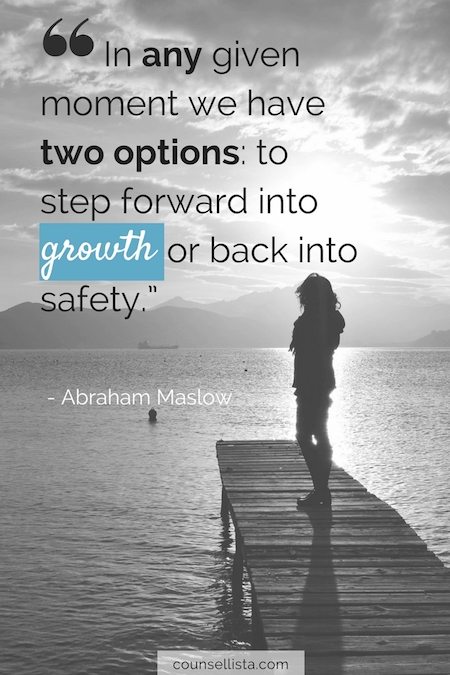
3. Anxiety symptoms treatment: meeting your essential emotional needs in balance
Essential emotional needs are exactly that – essential. Ideally, these needs need to be met in balance for you to have the best possible chance of being psychologically healthy and resilient.
Your essential emotional needs include:
- A sense of autonomy and control
- Security
- Attention (giving and receiving)
- Social interaction (close relationships and being part of a wider community)
- Meaning, purpose and a sense of achievement
- Self-esteem
When any of your emotional needs aren’t being met in balance, you’ll experience stress and unhappiness. This can either lead to or feel like anxiety.
But the good news is, you already have the necessary resources to ensure all of your essential emotional needs are met. For a more in-depth explanation of this, read my article: The Human Givens.
4. Self-help with a simple, effective, fast-acting stress relief technique for sudden panic or a difficult event
Any treatment for anxiety symptoms has to include effective stress relief techniques. You’ll need to have something at your fingertips to soothe and calm yourself when your heart is racing, you can’t think straight and you’re beginning to panic.
The best and easiest advice I can give you for this is 7/11 breathing:
- Breathe in for a count of 7
- And breathe out for a count of 11
As simple as that! The combination of focusing on your breath, counting and the extended outbreath will help you to calm yourself down and regain control.
Self-hypnosis
In addition, listening daily to a hypnosis download can make all the difference. Self-hypnosis with the help of a professionally developed download is very user-friendly and effective. For further information, see my article: Hypnosis FAQ and Downloads.
 It is normal to reflect on your experiences, but constant rumination on what’s happened in the past creates anxiety
It is normal to reflect on your experiences, but constant rumination on what’s happened in the past creates anxiety5. Talking therapy – professional counselling
As a (couple) therapist myself, of course I recommend that you talk with a professional counsellor. This is a particularly effective treatment for anxiety symptoms when life has been hard on you and one bad thing after another has happened. Frequent difficulties leave you feeling worn out and increasingly unable to cope.
Ideally, I’d like you to talk to a professional face-to-face, but I’m well aware that that’s often not possible. In which case, talking to professional counsellor online can be the next best thing. For further information on this see my article on online mental health counselling.
Professional counselling is also the ideal treatment option when you’ve suffered a trauma, be that a single event, a traumatic childhood or ongoing trauma as an adult (e.g. domestic abuse).
6. Specialist trauma treatment
Some traumatic experiences need to be untangled slowly. Some can be cured in one session alone. It depends on a combination of the following:
- Whether or not it was a single event trauma
- Whether you’re still exposed or…
- …how long ago it happened and more importantly…
- …what kind of adjustments you’ve made to help you cope with the immediate aftermath and longer-term consequences
- Your own general attitude in life
- If you’re still blaming someone
- How much support you’re receiving from loved ones
Your counsellor will take all of these things and more into consideration during your counselling. That enables them to tailor their support specifically to you and your situation.
If you think you need anxiety symptoms treatment because of a traumatic event, you might also like to read my other articles: Symptoms of PTSD and How to Cope with PTSD.
7. Medication, if you really want it
Below is a list of some of the medications your doctor may prescribe. If you hadn’t already noticed, I’m not an advocate of medication! So this list comes with my warnings too:
- Anti-anxiety drugs (but know that these are highly addictive)
- Antidepressants (but these are habit-forming, can be really difficult to come off and can cause anxiety, although pharmaceutical companies like to keep quiet about that according to Dr Peter Breggin)
- Beta blockers – see the image below for side effects…
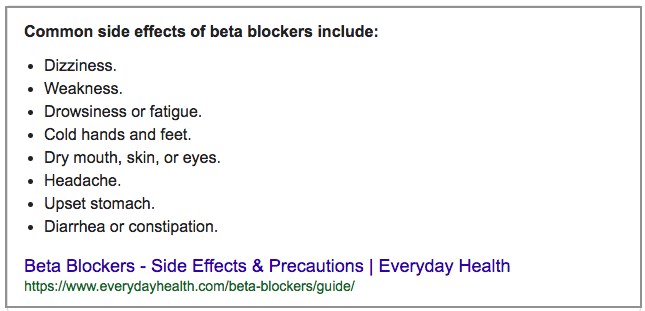
Of course, you’re entitled to choose the treatment that you feel most comfortable with, and medication is certainly available to you. But if you do want to explore it, I urge you to fully inform yourself of the benefits and risks associated with anything you may be prescribed.
8. Over the counter herbal remedies
As a much safer alternative to medication, there are various natural anxiety remedies on the market. A suitably qualified person at your local natural health store should be able to help you out with this.
You’ll also find various products online. To help you start your search, have a look at PureCalm from Native Remedies.
Dr Brent Bauer,MD gives an excellent overview of the research into the safety and effectiveness of herbal remedies for anxiety here.
9. Anxiety caused by substance abuse
Anxiety and substance abuse go hand-in-hand. Your alcohol or drug addiction may well have started as a way of self-medicating to cope with symptoms of anxiety. Or, if you weren’t anxious before you became addicted, anxiety is definitely one of the symptoms of addiction.
In the case of anxiety related to substance abuse, the most effective treatment is is rehab. Just treating the anxiety symptoms themselves won’t cut it – neither with medication or therapy alone. Even if you managed to temporarily kick the anxiety, you’d still be left with the addiction. And that has dangerous implications of its own.
See my article Symptoms of Alcohol Abuse for further information.
10. Predisposition to worry and stress from childhood
You might always have been generally anxious. Maybe…
- your mum or dad suffered from anxiety, or
- your mum had a stressful pregnancy, or
- you experienced severe childhood adversity.
This is where counselling or therapy can really help you to leave the past behind, learn new skills and move forward. I’m well aware, however, that you may not be in a position to access counselling. In which case, I want you to know that there’s sooo much you can do yourself. Start off by looking at the list of related articles on this sitemap. They’re all packed with tips, advice and strategies to help you cope with and overcome your anxiety.
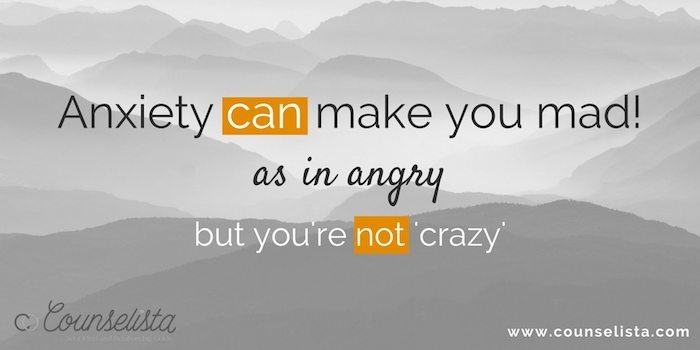
Finally
What next?
You may have finished this article, but just reading this and then searching for the next best thing really isn’t going to have any impact.
So, I hope my advice has helped you to see that you can take control of your anxiety symptoms treatment. Once you’ve identified the reasons for your stress, worry and fear, you can start working towards overcoming the difficulties you’re experiencing.
Based on what you’ve read here, you can now make a plan of action:
- Choose one or two treatment types
- Take action
- Follow through
I hope you’ll choose a path that doesn’t include medication though – because I know you already have the strength and skills you need to sort this!
Related Articles
Helping Your Partner Overcome Anxiety
Anger Management Counselling
Severe Depression Treatment
How to Deal with Depression
Common Relationship Problems
Natural Sleep Remedies
Do you need help?
Talk to an online counsellor…
Your problem is never too small or too big, too silly or too complicated to ask for help from a licensed therapist…
I want to upfront with you – I may earn a commission from BetterHelp. You pay the same fee, regardless.
Feel free to ask for help, or comment on this article

Hello you! 🙂
It’s me – Elly Prior, I’m the Founder and Author of this site. I’m a ‘real’ person! I’m hoping to make a positive difference, small or large, to every person who visits my site.
Do feel free to ask for help. I would be delighted to write a few lines to help you.
Alternatively, scroll back up to discover how you can connect with another professional counsellor. Or, for further information, see see my article on online, professional, mental health and relationship advice.
